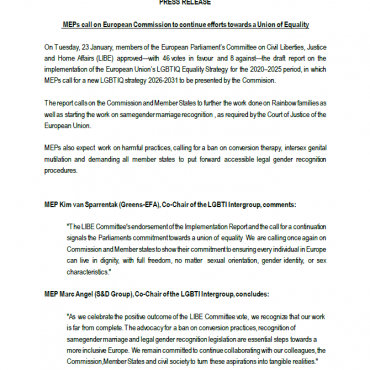European Parliament calls on Nigeria to stop persecuting LGBT people
Yesterday the European Parliament adopted a resolution on the situation in Nigeria, following widespread violence and a worrying economic situation. The resolution also condemns current legal threats to lesbian, gay, bisexual and transgender persons.
 The Same Gender Marriage Prohibition Bill was proposed in 2011, and has since been amended by the Nigerian Senate to punish those in a same-sex union with 14 years’ imprisonment, and anyone ‘aiding or abetting’ such unions with 10 years in prison.
The Same Gender Marriage Prohibition Bill was proposed in 2011, and has since been amended by the Nigerian Senate to punish those in a same-sex union with 14 years’ imprisonment, and anyone ‘aiding or abetting’ such unions with 10 years in prison.
In addition to locals, tourists or humanitarian aid workers who are in a same-sex marriage or civil partnership are at risk of arrest and prosecution. Those working in embassies but without diplomatic protection (such as technical staff) will also be subject to prosecution.
The European Parliament is calling “on the Nigerian Parliament to reject the ‘Same Gender Marriage Prohibition Bill’ which, if passed, would put LGBT people – both Nigerian nationals and foreigners – at serious risk of violence and arrest”.
It also “calls for the abolition of current legislation criminalising homosexuality, in some cases making it punishable by stoning”. Current legislation already punishes homosexual acts with 14 years’ imprisonment, or death by stoning in northern regions.
Michael Cashman MEP, Co-president of the European Parliament’s Intergroup on LGBT Rights, commented: “Nigeria is already among the world’s top oppressors of lesbian, gay, bisexual and transgender people. Why such a law now? Nigeria needs to follow the example of countries like Rwanda, Kenya or South Africa, which prove African nations don’t need to persecute the vulnerable in order to strive.”
Ulrike Lunacek MEP, Co-president of the LGBT Intergroup, continued: “Our Nigerian sisters and brothers have the European Parliament’s full solidarity in these difficult times. No group has ever called for same-sex marriage in Nigeria; our fellow lawmakers should stop obsessing about citizens’ private lives, and start tackling the dire socio-economic situation in Nigeria.”
Read more:






